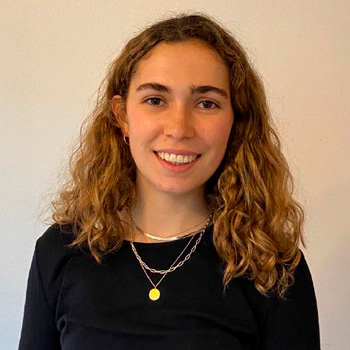Ariadna Plans
4. Kaleidocope
How to engineer planetary wellbeing?
Ariadna Quingles (shown in the picture) and Ariadna Plans, co-organizers of the Ted Talks session ‘TEDxUPF Engineering Planetary Wellbeing’ and biomedical engineering students at UPF
What does it mean to ‘be an engineer’? It means being someone who looks for solutions to problems. And what is the current problem? The future of our planet. Global warming, climate change, water scarcity, biodiversity loss, food waste, deforestation, microplastics, epidemics, socio-economic conflicts, etc. are all problems that are part of our daily lives and concern us.
The Earth is like a living being that needs to be cared for, nourished and allowed to breathe by everyone who inhabits it. For more than a century now, we have not been taking enough care of it, and that concerns us. We are concerned that, in the future, we may not live as well. We are concerned about planetary wellbeing.
We are two biomedical engineering students at Pompeu Fabra University. We both have the strange feeling that, even though we are about to graduate, we know a bit about everything and, at the same time, nothing at all. That said, we agree that we have acquired the ability to develop the necessary tools to better respond to our concerns. So, why not apply them to ensure planetary wellbeing?
In Catalonia, we have great professionals, good hospitals, cutting-edge research, and competitive companies. We stand out, not just for the landscape, climate, food and culture, but as a place for developing ideas and businesses. We are the ‘Iberian California’. We have professionals who believe and who want to make us see that, if we can raise awareness, our planet stands a chance. We also have people with the curiosity and initiative to do things and do them well. People like you, who have found the time to read this article.
That is why, in October 2023, with the help of UPF’s Department of Information and Communication Technologies (DTIC), we organized the event ‘TEDxUPF Engineering Planetary Wellbeing’, in which experts in the field presented the issues and possible solutions to achieve planetary wellbeing. The DTIC is recognized as a María de Maeztu (MdM) Unit of Excellence, and planetary wellbeing is one of the priorities of its MdM strategic programme.
The term ‘planetary wellbeing’ encompasses the planet and its problems. It involves the application of artificial intelligence (AI), the manipulation of organisms, innovation in food and medicine, efficient energy systems and sustainable housing. It means critically assessing the current system to improve everything that undermines wellbeing.
Just as there are experts with the training to work on and think about – that is, engineer – planetary wellbeing, why can’t we do the same?
Do you know what a climate clock is? A climate clock tells us how much time is left to act before the Earth’s temperature rises 1.5 ºC, a key threshold for global warming. New York, Berlin, Kazakhstan and Glasgow all have climate clocks already. Why not have one in Barcelona? Barcelona has the potential to be a global technology, knowledge and innovation hub to engineer planetary wellbeing.
As of 6:27 and 30 seconds p.m. on 13 December 2023, the climate clock reads, ‘5 years, 220 days, 22 hours, 32 minutes and 42 seconds, 41 seconds, 40...’ until the change is irreversible. As the activists’ saying goes: ‘Help us save the planet.’
You, too, are a planetary wellbeing engineer! While each of us has a different point of view, we can all reflect on how to improve planetary wellbeing. The first step is to become aware of this ability. We can work together to build a planetary future, reflecting on everyday issues, from how we go to school or work to what we eat, how we live and what we do. So, we encourage you to share your ideas. What do you propose we do to engineer planetary wellbeing?

